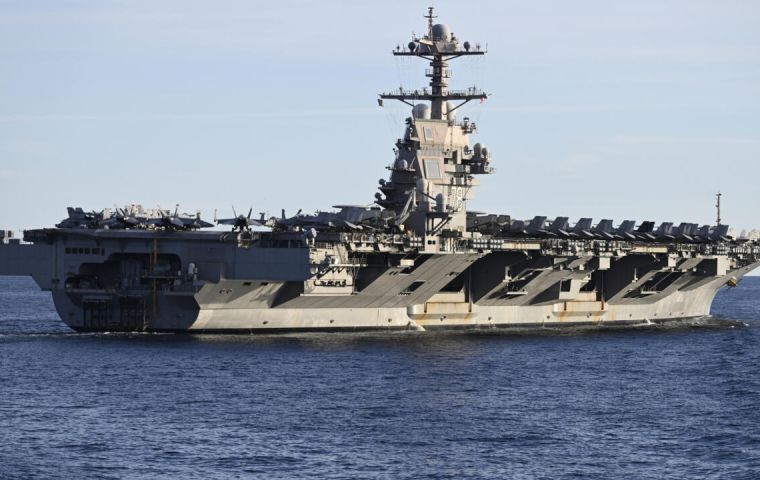MercoPress. South Atlantic News Agency
USS Gerald Ford in the Caribbean sparks Venezuelan military mobilization
 The USS Gerald Ford was deployed from the Mediterranean to the Caribbean to up the ante against alleged drug traffickers in the area
The USS Gerald Ford was deployed from the Mediterranean to the Caribbean to up the ante against alleged drug traffickers in the area The USS Gerald Ford, the world's largest aircraft carrier, arrived in the Caribbean Sea on Tuesday, reinforcing the US military presence in Latin America for what the Pentagon claims is an operation to combat drug trafficking.
The deployment of the nuclear-powered vessel, which carries more than 5,000 personnel and up to 75 aircraft, including F-18 fighter jets, was met with an immediate and massive military response from Venezuela. The Bolivarian Armed Forces, including civilian militias, initiated a new phase of military exercises across Venezuelan territory.
Defense Minister Vladimir Padrino López declared a “massive deployment” of ground, air, and river forces, asserting that Venezuela was ready to defend its sovereignty in the face of what it terms an “imperialist threat.”
The Gerald Ford strike group, which includes guided missile warships, destroyers, and submarines, was deployed to Latin America in late October, traversing over 8,000 kilometers from the Mediterranean Sea.
The Pentagon claims the fleet's objective is to “combat drug trafficking and dismantle transnational criminal organizations,” joining an existing US fleet that includes eight warships and a nuclear submarine.
Venezuelan President Nicolás Maduro maintains that the White House's actual goal is to remove him from power. The deployment comes amid aggressive rhetoric from the US, which is offering a US$50 million reward for information leading to Maduro's arrest for commanding a drug cartel classified as a terrorist organization.
The US naval deployment and its accompanying operations have triggered a diplomatic rift with key allies over the lethality of recent anti-drug operations in the Caribbean. The United Kingdom has reportedly suspended maritime intelligence sharing with the US concerning suspected drug trafficking vessels. British officials believe that recent US military attacks, which are believed to have resulted in at least 76 deaths across 19 strikes since September, violate international law, as the operations now include lethal measures against smaller vessels rather than traditional interception and boarding. The United Nations High Commissioner for Human Rights, Volker Türk, condemned the strikes as a “clear violation of international law,” labeling them “extrajudicial executions.”
Canada, another long-standing partner, has also formally asked Washington not to use Canadian intelligence in any lethal operations. Military sources within the US have also raised concerns. Admiral Alvin Holsey, head of US Southern Command, offered his resignation after questioning the legality of the strikes. Legal experts contend that the US justification—labeling drug traffickers as “enemy combatants”—does not hold up under international law.
Meanwhile, Maduro enacted the Law on the Command for the Comprehensive Defense of the Nation on Tuesday, which, in his words, “powerfully institutionalizes joint responsibility for the defense of the nation,” reflecting the military doctrine of “Integral Defense of the Nation.” The new 22-article law is intended to synthesize the principle of “shared responsibility of the whole society, of the whole nation” and formalize what Maduro called the “popular, military, and police fusion.”




Top Comments
Disclaimer & comment rulesCommenting for this story is now closed.
If you have a Facebook account, become a fan and comment on our Facebook Page!